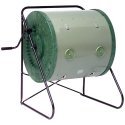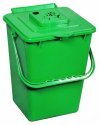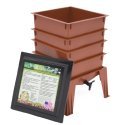What is Mushroom Compost?
Mushroom Compost is basically a delicately produced compost of materials for the commercial harvesting of mushrooms. The kind of mushroom to be commercially harvested is pretty much irrelevant, since the basic conditions that permit mushroom farming use the same kinds of composts. Mushroom compost is a fairly new concept that came about officially in the year 1678 by French botanist Marchant upon presenting the transplantation of the white filament found under mushrooms into an adequate medium (mushroom compost), to the Academy of Science.
Mushrooms have been venerated throughout the ages, and from ages past to this very day, they continue to allure and motivate the human soul. In ancient Vedic cultures, the mushroom was venerated as a god. 4600 years ago, the Egyptians believed that mushrooms were the plant of immortality. Reserved only for the nobility of their time, mushrooms continue a delicacy to this day. Due to the fact that it was only possible to find mushrooms in the wild or growing wherever whenever, the gods felt like it, mushrooms had always been a thing of restricted consumption.
After Marchant however, that changed, since mushrooms have since then been harvested on mushroom farms. In Paris, the first commercially harvested mushrooms were done in old roman quarry caves around the city, and these were named champignons de Paris. The kind of compost that these mushroom farmers would use was the same they used for growing melons. A kind of mix between the soil found there and horse manure. In the early 1950′s a plant pathologist and mycologist in India named Shri S.S. Jain, was living with farmers, trying to help with their apple orchards, when he discovered mushrooms growing in the darkness of a barn on top of rotten apple branches, cow manure, twigs, wheat and other fruit tree branches. Mushroom compost rediscovered!
Today, mushroom farmers use mostly an industrialized and controlled process of making mushroom compost, pasteurizing the compost, using it, and after harvest, selling it as fertilizer for gardens. Mushroom compost is very nutritious in and of itself, as are the byproducts, SMC (Spent Mushroom Compost) or SMS (Spent Mushroom Soil). Usually in the making of mushroom compost, some kind of vegetarian manure is used, like horse, cow, or chicken, as well as hay, or dry grass as a good base, with corn cobs to help nitrogen levels. Gypsum which is a calcium sulfate is also usually found in todays modern mushroom compost.
Once made mushroom compost must be pasteurized in order to keep the aerobic microorganisms alive that help the roots thrive such as benefic nematodes, and thereby eliminating any other types of fungi that may want to take advantage of the wonderful conditions found in mushroom compost. All in all, once mushroom compost has been fully used and the mushrooms harvested, the compost itself, is then reused in gardens as the SMCs and SMSs. If the gardener is looking for the perfect fertilizer, that is 100 percent environmentally friendly, then it has certainly been discovered. Spent Mushroom Compost.





